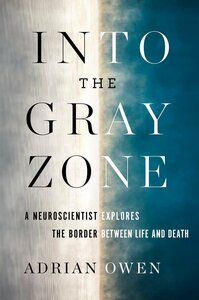Take a photo of a barcode or cover
44 reviews for:
Into the Gray Zone: A Neuroscientist Explores the Border Between Life and Death
Adrian Owen
44 reviews for:
Into the Gray Zone: A Neuroscientist Explores the Border Between Life and Death
Adrian Owen
medium-paced
informative
inspiring
medium-paced
emotional
informative
sad
medium-paced
Really interesting and riveting. This guy isn't an amazing writer by any means but when it's hard to put down a nonfiction book you have something good on your hands.
emotional
informative
sad
fast-paced
I enjoyed this quite a lot. The author does a good job of explaining the "gray zone" and the questions neuroscience is working on answering. His explanations are easy to read and understand, but not so simplified that I (having a medical background) felt talked down to at all.
The whole field of neurology and neuroscience is fascinating to me. The brain is such a poorly understood organ. Every time I turn around, something new is discovered. The advances in technology of MRI and fMRI has done amazing things for the field, as the author does a good job of describing.
I found the book sad and frightening as well. There is the potential for a significant percent of the population thought to be in a vegetative state to actually still be "in there" and aware. Without doubt, some of these patients are deteriorating alone and ignored in understaffed, underfunded care facilities. What a horrible thought! It also raises the question of how many people thought to be vegetative and removed from life support actually knew what was going on and didn't want it. Right now, an fMRI is not used to determine brain death; maybe books like this will push for that? Of course, fMRI is not widely available and the population of those "in the grey zone" versus actually vegetative appears to be quite small. It seems a huge opportunity for raising a lot of false hopes.
As a nurse, I admit that we as medical staff, at least in my experience and in busy departments like the ER, have a tendency to forget that people are "in there". Even if they aren't considered vegetative but simply have suffered a stroke and cannot verbally communicate, I've noticed a tendency to talk over the patient, to one another, forgetting to let the patient know what is going on. Books like this are a good reminder for me.
My only real complaint is that the author doesn't give many examples of those they tested and found to NOT be in the grey zone. Reading this makes it sound like many people are, further increasing the concern for false hopes.
The whole field of neurology and neuroscience is fascinating to me. The brain is such a poorly understood organ. Every time I turn around, something new is discovered. The advances in technology of MRI and fMRI has done amazing things for the field, as the author does a good job of describing.
I found the book sad and frightening as well. There is the potential for a significant percent of the population thought to be in a vegetative state to actually still be "in there" and aware. Without doubt, some of these patients are deteriorating alone and ignored in understaffed, underfunded care facilities. What a horrible thought! It also raises the question of how many people thought to be vegetative and removed from life support actually knew what was going on and didn't want it. Right now, an fMRI is not used to determine brain death; maybe books like this will push for that? Of course, fMRI is not widely available and the population of those "in the grey zone" versus actually vegetative appears to be quite small. It seems a huge opportunity for raising a lot of false hopes.
As a nurse, I admit that we as medical staff, at least in my experience and in busy departments like the ER, have a tendency to forget that people are "in there". Even if they aren't considered vegetative but simply have suffered a stroke and cannot verbally communicate, I've noticed a tendency to talk over the patient, to one another, forgetting to let the patient know what is going on. Books like this are a good reminder for me.
My only real complaint is that the author doesn't give many examples of those they tested and found to NOT be in the grey zone. Reading this makes it sound like many people are, further increasing the concern for false hopes.
Fascinating book about fMRI techniques to assess consciousness in vegetative and minimally conscious patients using yes/no answers. Also something that provokes utter horror in me personally. Deep and meaningful discussions about what really is a fate worse than death and families’, patients’ and the law’s view on this.
informative
inspiring
medium-paced
emotional
hopeful
informative
slow-paced
A patient has a traumatic accident and, after fighting for their life, stabilizes, but then slips into a vegetative state. Doctors cannot detect any signs of consciousness. However, the individual is aware of everything that is going on but is unable to communicate in any way. This is the basis of Adrian Owen's research into the "gray zone." It is estimated that up to 20% of patients diagnosed as being in a vegetative state could have awareness. If you could scan their brain while providing visual or audio prompts designed to active certain areas of the brain, could you achieve basic yes/no communications? Fascinating stuff!



